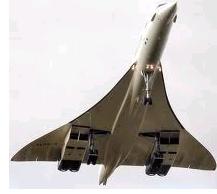Concorde crash
Court clears Continental of criminal charges in Concorde crash
 A French appeals court Thursday reversed an earlier ruling, clearing Continental Airlines of criminal charges in connection with the crash of an Air France supersonic Concorde in 2000, a court official said.
A French appeals court Thursday reversed an earlier ruling, clearing Continental Airlines of criminal charges in connection with the crash of an Air France supersonic Concorde in 2000, a court official said.
The ruling ends more than a decade of legal wrangling in a case that in part led Air France and British Airways to drop the droop-nosed airliner from their fleets.
The court also dropped charges against two employees of Continental, which merged with UAL Corp., the parent company of United Airlines, in 2010 to become United Continental Holdings Inc. A manager of the French civil-aviation authority, DGAC, was also cleared.
However, the appeals court in Versailles, outside of Paris, also concluded that Continental had some responsibility in a separate civil case, upholding an earlier ruling that ordered the airline to pay €1 million ($1.3 million) in damages to Air France for having caused harm to the airline's image.
"We are very pleased with the court's findings that Air France was in no way responsible for the accident, despite what Continental has been claiming for the last 12 years," said Air France lawyer Fernand Garnault.
In a 2010 ruling, a French court found Continental responsible for having caused the accident, ordering it to pay a fine of €200,000 to the state and €1 million to Air France, part of the Franco-Dutch Air France-KLM group.
The appeals court agreed with the scenario presented by experts that the Concorde crashed shortly after takeoff from Charles de Gaulle airport near Paris because a metal strip had fallen off a Continental airliner.
When the Concorde later ran over the strip on its takeoff run, the part blew one of the plane's tires. Fragments from the tire then slammed into the plane's wing, causing a fuel tank to burst, and the escaping fuel caught fire. The appeals court judge said this series of events wasn't sufficient to justify criminal charges against Continental, but he said that Continental employees bore some responsibility in the civil case.
Lawyers for Continental have acknowledged that the metal strip came from its plane, but they have consistently said that other factors also came into play. "For 12 years the airline was wrongly accused," Continental lawyer Olivier Metzner said on French television.
The Concorde slammed into a hotel as it took off for New York on July 25, 2000, killing all 100 passengers, nine crew members and four people on the ground.
United Continental said that it had already paid court-ordered damages after an earlier trial but that it was still reviewing Thursday's verdict.
"This was a tragic accident, and we support the court's decision that Continental did not bear fault," United Continental said in a emailed statement. "We have long maintained that neither Continental nor its employees were responsible for this tragic event and are satisfied that this verdict was overturned."
The case has been closely watched by safety and legal experts as a bellwether of government moves around the world to criminalize airliner crashes. From Spain to Greece to Latin America, prosecutors over the years have sought to pursue criminal charges against pilots and other aviation officials.
But more recently, various safety groups and the International Civil Aviation Organization, an arm of the United Nations, have pushed back hard to persuade judges, magistrates and prosecutors to avoid continuing down that path. These critics contend that criminal cases threaten to chill voluntary reports of safety hazards and interfere with airline efforts to analyze and safeguard other confidential safety data.
In the U.S., prosecutors and judges have refrained from interfering with commercial air-crash investigations.
Mr. Garnault, the Air France lawyer, said that in France the tendency has been to "haul people in front of a criminal court whenever there's a big complicated issue" such as a major accident. He said that "very often there's no reason for a criminal judge" to get involved.
The Flight Safety Foundation, a leading international safety group based in Alexandria, Va., praised the appeals court ruling for recognizing that professional human error doesn't amount to criminal conduct.
(Published by WSJ - November 29, 2012)